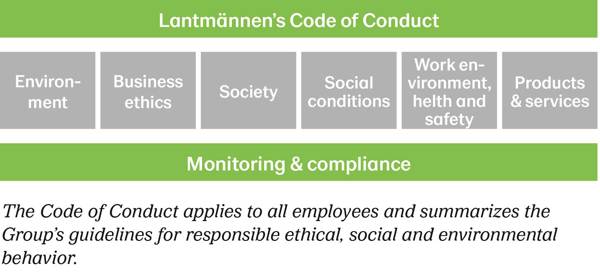
Lantmännen is an agricultural cooperative and Northern Europe’s leader in agriculture, machinery, bioenergy and food products.
Responsibility from field to fork is a part of Lantmännen's strategy for long term profitability and a thriving farming. The sustainability strategy, with related strategies for organic and climate, and the work with sustainable business develoment is integrated in our strategic business planning. It is anchored in the Group Management team and the Board of Directors.
Responsibility from field to fork is a foundation for Lantmännen’s strategy for long-term profitability and a thriving farming. Work on sustainable business development is integrated in our strategic business planning and with commitment in Group Management and the Board of Directors.
Our responsibility is defined in Lantmännen's Code of Conduct. The code provides guidelines for responsibility in the different special areas that are relevant to Lantmännen's operations, and these are based on the Global Compact's ten principles on human rights, labour, the environment and anti-corruption. For many areas, there are specific policies and guidelines.
The Code of Conduct applies to all Lantmännen employees as well as board members and trustees in the organization. Certain parts also apply to our suppliers and business partners. These parts are specified in our Supplier Code of Conduct. Compliance with the Code of Conduct is monitored annually by Group management.
Reporting of non-compliances to the Code of Conduct can be done either to a manager or anonymously through an external whistleblowing function.

Download and read our Code of Conduct in its entirety
Implementation of the Code of Conduct throughout the business is an important part in managing risk and ensuring responsibility. All employees are trained in the code, and compliance is monitored annually by group management.
Lantmännen has strict requirements on ethical behaviour in all business relations and works against corruption and to support fair competition. The Code of Conduct clarifies that we have zero tolerance regarding bribes and anti competitive behaviour. All employees are trained in the Code of Conduct and there are specific trainings in anti corruption and anti competitive behaviour. Compliance is followed up systematically and on business unit level and group level. All employees can report deviations in a whistleblowing-system.
Each area of the Code of Conduct comes under the responsibility of different members of Group management, apart from the 'products' area, where each head of sector is responsible. The members of Group Management Team responsible for areas of the Code of Conduct serve on Lantmännen's CSR committee, with overall responsibility for the implementation and monitoring of the work and decisions on policy issues.
Executive Vice President Operations - Chairman
Director Sustainable Development, GF Sustainable Development – Convener
General Counsel and Compliance officer, GF Legal Affairs & Compliance
Group Chief Financial Officer, GF Finance and Treasury
Director Group Brand & Marketing, GF Brand & Marketing
Head of HR and Internal Communication, GF Human Resources & Internal Communication
Director Group R&D, GF R&D
The responsibility for working according to the Code of Conduct, policys and towards the sustainability ambition, targets and aligned with stratagies lies with all the Group.Follow up and analysis of how the operations develop is done on different levels and with different frequency.Follow up on sustainability for all business is conducted every tertial for divisions and business, with a number of indicators, the Minimum Responsibility Requirements. Example of requirements are training in the Code of Conduct and Business Ethics, share of approved supplier Code of Conduct, accident rate, sick leave and progress on climate work. Group Management's tertials follow up with each business management, includes a review of the responsibility issues in the business is done, the so called Sustainability Business Review.
For our production there is an annual follow up on product quality and processes, sustainability results, contracts for purchase and sales and product specific requirements. A part of this is an analysis of how the food production has implemented Lantmännen's Criteria for Responsibly produced food. Compliance with the areas and issues in the Code of Conduct are monitored annually in te CSR-council by scorecards and is reported to the Management team. The Board of directors follow up on deviations to the Code of Conduct.
Sustainability data and information are collected annually, analyzed on a business, country and site level. Reporting is communicated externally in Lantmännen's Annual Report with Sustainability Report, published by the Board of directors. The reporting is a base for other reporting such as United Nations Global Compact, RSPO (Roundtable on Sustainable Palm Oil) and The Haga Intiative's Climate report.